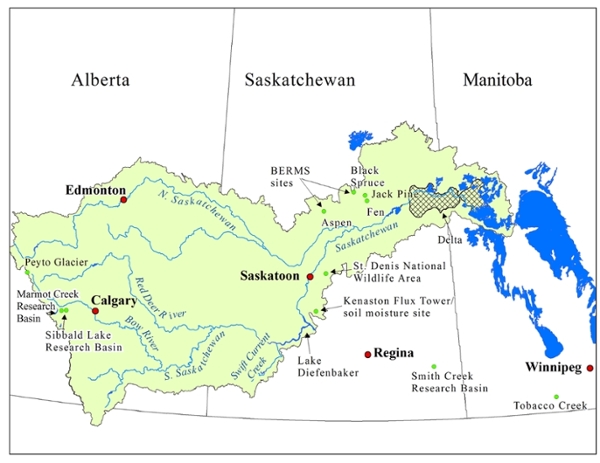About the Saskatchewan River Basin
The 406,000 square kilometre Saskatchewan River Basin (SaskRB) is the major water resource for the three Prairie provinces and is representative of many global water security challenges. Our institute has over 15 research sites throughout the river basin from the Rocky Mountains in Alberta through to Manitoba.

Water Challenges:
- Urban growth and agricultural intensification are increasing pressures on water quality in the basin.
- The 2013 Alberta floods and the 1999-2001 Prairie drought each caused >$5 Billion in economic losses. Such extreme events are projected to increase with climate warming.
To date, the SaskRB project has delivered:
- New instrumentation and process insights for key biomes
- New understanding and modelling of threats to water quality
- Improved large-scale hydrological models; new approaches to water resource vulnerability assessment
- User-focused decision support tools for water resource futures
These projects are supported through the Canada Excellence Research Chair in Water Security and the Canada Foundation for Innovation.
Our SaskRB project is a Regional Hydroclimate Project of the World Climate Research Program’s Global Energy and Water Exchanges (GEWEX)
The Saskatchewan River Basin as a GEWEX RHP provides a much-needed regional-scale focus for integration of GEWEX science, based on detailed ground-based observations and integrated modelling and data assimilation of atmospheric, land surface and hydrological processes. It also plays a keystone role in linking Canadian and US hydroclimate science through integration with the proposed North American Water Project and the Canadian Changing Cold Regions Network, which addresses the whole of interior western Canada by including the Mackenzie and Peace-Athabasca rivers.
Study deliverables:- Deliver improved scientific understanding and predictive capability to address the interactions amongst the cryospheric, ecological, hydrological and climatic components of the changing earth system at multiple scales.
- Provide new understanding, improved modelling tools and enhanced community awareness for improved water management in the SRB.
- Improve our understanding of the consequences of agricultural practices, and land use and climate change for water resources and their management in interior western Canada.
- Provide an improved understanding of critical policy choices in the region’s water future.
- Train a new generation of water scientists better prepared to deal with integrated water systems and the human institutions that govern them.
- Develop and implement systems that ensures research is made available to users in ways that will facilitate planning and decision making.
